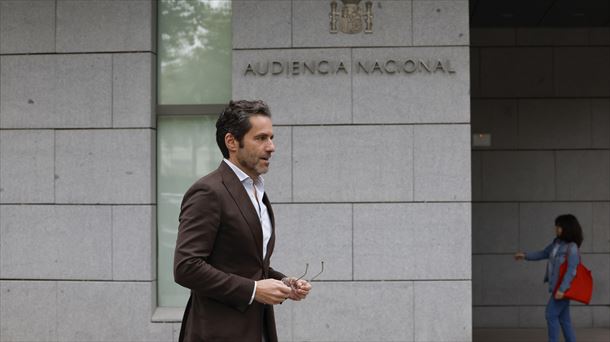The Biscayan gudari fought against Franco’s forces in the 1936 war and were arrested by the Nazis during his exile in France, transferred to a concentration camp, and shot and cremated in Prague.
The institutions of Prague (Czech Republic) held an event to: honor the memory of the Basque gudari Ángel Lekuonawho was shot by the Nazis on 10 April 1945 while imprisoned in Hraistko, a concentration camp of the Third Reich, after being deported from France, where he went into exile after the 1936 war.
Together with him, they also commemorated six other anti-Franco fighters who were murdered in the same concentration camp: Enric Moner, Pedro Raga, Antonio Medina, Rafael Moya and Antonio Clemente.
The director of the Institute for Memory, Coexistence and Human Rights-Gogora, Aintzane Ezenarroattended this institutional act on behalf of the Basque government, together with Angel Lekuona’s family.
Anton GandariasLekuona’s cousin, took the floor to thank the institutions responsible for the cemetery for their cooperation, which facilitated access to the documentation about his relative, and also to the investigators who cooperated in clarifying the facts.
This act of remembrance and recognition of these seven victims has been jointly promoted by the Prague City Council, who are responsible for the Cemetery Strasnicewhere the victims’ monument is located, and the working group for the preservation of the memory of the deportees from the Hradischko camp, consisting of relatives of victims and researchers.
This group works to clarify the facts through historical research, denounce and preserve the memory of the deportees.
This afternoon the families of the victims were found in the Prague cemetery. In 1945, Frantisek Suchm was the administrator of the Strasnice civilian crematorium in Prague, the place where the Nazis took the bodies of those who died in Hradischko, a small Czech subcamp that depended on the Flossenbürg concentration camp.
In April he has ordered to burn the hundreds of corpses and remove their remains But he did not obey, collected the ashes of each body separately in a separate urn, and together with his son wrote the name of the deceased on a list and hid the containers in the cemetery.
Thanks to the documentation, the families have been able to know that their relatives were cremated there, as well as find their ashes, which rest in the memorial of the Prague cemetery.
The ashes of Angel Lekuona will rest in the stranice civil crematorium memorial, in Prague. His family moved there to the land of his birthplace, the farm Apraize, in the Altamira de Busturia district.
In May, the City Council of Busturia and Gogora will place in the municipality itself, a memorial plaquecalled Stolpersteine, with the name and date of birth and death of Angel Lekuona.
Angel Lekuona was born in Busturia, on March 1, 1913, during the 1936 war he fought for the Republic, which led him to go into exile in France after the war. There he was in several concentration camps and when the Nazis occupied France they deported him and after he passed other camps he was shot dead on April 10, 1945 in Hraistko, a concentration camp of the Third Reich, in what is now the Czech Republic. Republic.
According to a study published by the Gogora Institute in 2020, “The deportation of Basques to the camps of the Third Reich (1940-1945)”, 253 people were deported; 113 died, 125 came out alive, while what happened to another 15 is unknown.
Source: EITB
I’m Wayne Wickman, a professional journalist and author for Today Times Live. My specialty is covering global news and current events, offering readers a unique perspective on the world’s most pressing issues. I’m passionate about storytelling and helping people stay informed on the goings-on of our planet.



